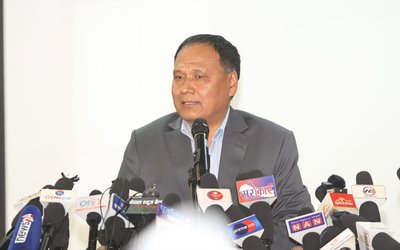
Although the three major political parties have been saying that there is the need of a political consensus to implement the new constitution, nothing is moving towards that direction as their differences have widened following the elections at the Legislature Parliament for the posts of prime minister, president, vice-president, speaker and deputy speaker.
If politics moves as it is, the new constitution will be unlikely to see its full provisions being implemented soon. Nothing is possible without political consensus even as there are tasks aplenty, from replacing almost 200 acts to delineating the border of provinces and local bodies.
At a time when Madhesh-based parties are already into their advanced phase of agitation, demanding rewriting of the new constitution, the isolation of the main opposition party Nepali Congress is another stumbling block for the implementation of the constitution. The relations among the major three, Nepali Congress, CPN-UML and UCPN-Maoist, soured over sharing president, vice president and speaker of Legislature Parliament among them.
After unilateral nomination of justice in the Supreme Court, the relations between the CPN-UML and UCPN-Maoist also soured as speaker of Legislature Parliament returned the name of nominees.
If political parties do not come closer to settle on the issue of formulating the Rule on the Conduct of Business of Legislature Parliament, the appointment of chief justice will be delayed.
Even the appointment of ten new judges recommended by Judicial Council is uncertain in the absence of the Hearing Committee in the Legislature-Parliament.
According to the Constitution of Nepal 2015, a parliamentary hearing is mandatory for appointment of the chief justice and other judges. Following the hearing, the president will appoint the chief justice on the recommendation of the Constitutional Council as Judicial Council has already recommended the name of senior-most Supreme Court Justice Sushila Karki to the top judicial post.
As the leader of the main opposition party is yet to be elected by the Parliamentary Party of Nepali Congress, the Constitutional Council recommendations are likely to invite controversy. The Supreme Court gave a verdict three years ago that the presence of main opposition leader is necessary for appointment in the constitutional bodies.
With the widening of political differences among the big three, the process of formulation of Rule on the Conduct of Business of Legislature Parliament is now pending, hampering the appointment of judges, chief justice and other heads of the constitutional bodies.
The stalled appointments at the constitutional bodies may invite a constitutional deadlock in the coming days.
- IME GROUP: Expands Into Paper Industry
- Mar 24, 2025
- CPN UML: Instigated By India
- Mar 23, 2025
- ADB’S CHIEF ECONOMIST: Nepal Reduces Poverty
- Mar 11, 2025
- FM DR. DEUBA: A Successful Visit
- Mar 11, 2025
- MD GHISING: Target Of Personal Grudge
- Mar 09, 2025















